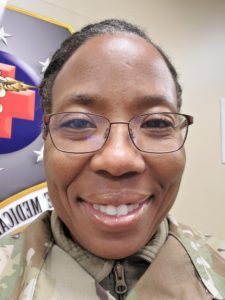Gwendolyn Foster, USAF, NC
Certified Nurse-midwife
 When I started preparing to write my response, as a black woman and certified nurse-midwife in the military, I started thinking about all we do to create change and how we support each other while doing it. Too many times, we are not wanted in the room, yet we continue to push forward, displaying actions that say we belong. Della Raney Jackson was the first black nurse commissioned in the US Army during WWII. She, with so many others before me, did not let “no” deter her, and we cannot afford to do so now. New unimagined opportunities are now available to us due to strong courageous black women. We got to where we are now by these women who asked the tough questions and showed it could be done. Brigadier General Hazel Johnson-Brown served in Japan and Korea training nurses headed to Vietnam. She forged the impression of black women nurses who serve by becoming the first black woman to achieve the rank of brigadier general in the Army. In this day and age, just because we have come a long way, that doesn’t mean we don’t have much to do; we must continue to remain vigilant. When I put the uniform on to care for our Airmen, Sailors, Soldiers, and Marines, no matter how much others would have liked me to, I do not stop being a black woman.
When I started preparing to write my response, as a black woman and certified nurse-midwife in the military, I started thinking about all we do to create change and how we support each other while doing it. Too many times, we are not wanted in the room, yet we continue to push forward, displaying actions that say we belong. Della Raney Jackson was the first black nurse commissioned in the US Army during WWII. She, with so many others before me, did not let “no” deter her, and we cannot afford to do so now. New unimagined opportunities are now available to us due to strong courageous black women. We got to where we are now by these women who asked the tough questions and showed it could be done. Brigadier General Hazel Johnson-Brown served in Japan and Korea training nurses headed to Vietnam. She forged the impression of black women nurses who serve by becoming the first black woman to achieve the rank of brigadier general in the Army. In this day and age, just because we have come a long way, that doesn’t mean we don’t have much to do; we must continue to remain vigilant. When I put the uniform on to care for our Airmen, Sailors, Soldiers, and Marines, no matter how much others would have liked me to, I do not stop being a black woman.
I joined because I wanted to do what I love and do it in uniform. I never forget, every time I put on this uniform, I am here to improve the care for women and leave it a little better than I found it for the women after me. Whether that be researching how to improve care for women while deployed, mentoring junior female nurses on leadership, or just being real for a second and sharing my struggles during my deployment to Iraq, I am here for them. The mistakes I have made along the way on this military journey or even the realities of sometimes being the only black female officer in the room, cause me to pause and remember the old proverb that it is not about how far I can get alone but how much farther we can go together.
As black women, we are also mothers, spouses, partners, daughters, and friends, all with our own unique qualities that make us stronger. As black military nurses, we cannot afford to sit on the sideline waiting for the invitation to make a change because there is no one who can advocate best for our needs. It is very real that black women are twice as likely to die in pregnancy and birth. Thus, we have a responsibility to use our voices to destruct the systemic biases and racial inequities that persist in health care. Only we have walked in our boots, and as the hundreds of women before us, we must continue to speak up.



